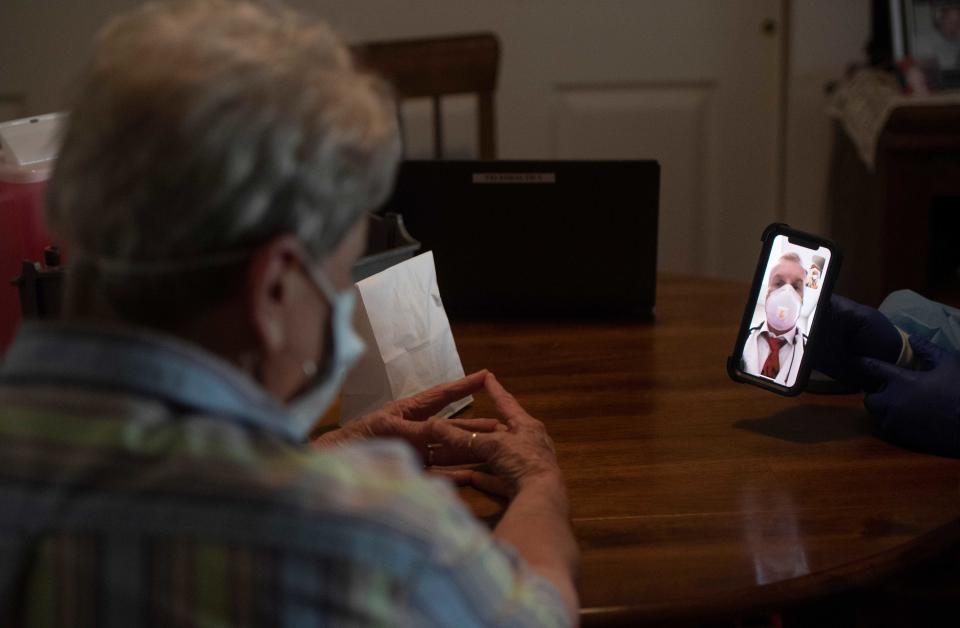Fears new ‘prison-style’ care home rules will leave vulnerable people distressed


The government has been criticised for proposing “prison-style” visits to the elderly in care homes during lockdown.
The proposals would allow visits in care homes to take place either outside or with a screen between the resident and guests communicating through phones.
Kate Lee, chief executive at the Alzheimer’s Society, said the guidance “completely misses the point” for those with conditions such as dementia and their families.
She said: “The prison-style screens the Government proposes, with people speaking through phones, are frankly ridiculous when you consider someone with advanced dementia can often be bed-bound and struggling to speak.

Read more: Coronavirus infections up 10,000 in week – as stats reveal just 6 in 10 contacts reached
“They won’t understand and will be distressed by what’s going on around them.
“Aside from the naive assumption that care homes have the resource, the space and time to build these screens, distraught families will read this news and despair.”
From Thursday so-called “ad-hoc” visits will not be allowed although care homes “will be encouraged and supported to provide safe visiting opportunities”, the Department of Health and Social Care (DHSC) said.
Care experts dismissed the government guidance as “warm words” that lacked the detail needed to reassure many families.
Watch: Buckland: Care home guidance to be announced shortly
The National Care Forum (NCF) acknowledged the “sentiment” of the measures but said extra financial support and practical safety measures were also needed.
The organisation demanded that the DHSC provide clarity on the guidance, which was issued less than 12 hours before the start of a second, four-week, lockdown in England.
The guidance cites a number of ways that care home visitors could be accommodated, including having designated visitor pods with floor-to-ceiling screens and separate entrances, and outdoor meet-ups with one other person.
It also approved visits at windows, “where the visitor doesn’t need to come inside the care home or where the visitor remains in their car, and the resident is socially distanced”.
The NFC said that the measures, which come into force ahead of a bout of chilly weather predicted by the Met Office, would “literally leave people out in the cold”.
Read more: Secondary school pupils will have to wear masks - but not in the classroom

Campaigners have said the government has not provided enough detail to make any plans workable.
On Wednesday the only guidance published about care homes visits was a single press release.
Julia Jones, from dementia rights organisation John’s Campaign, told BBC Radio 4’s Today programme: “The problem is we haven’t actually got the guidance to comment on, all we’ve actually got is a press release, and here we are on the first morning of lockdown with a press release to look at.
“Very often it (government guidance) seems to make things more confusing and makes matters worse.”
She added: “I think it’s terribly, terribly sad that some people in this country will be pathetically grateful for the chance to go and look at the person they love through a window. I hesitate to call this a ‘visit’.”
Jones described so-called “virtual visits” to care homes between loved ones through video conference services as “rubbish” – the government has said it will put 11,000 iPad devices in care homes to facilitate virtual meetings.
She said: “Visits need to be meaningful. When people are in the later stages of dementia, when people love each other, when people are approaching the end of their lives, they need to hold hands – they don’t need to be in a Perspex bubble.”
Justice secretary Robert Buckland, asked about the prospect of regularly testing nominated family members before care home visits, told BBC Radio 4’s Today programme that the government was “interested in all ideas that are COVID-compliant” and that its own guidance is “non-exhaustive”.
Coronavirus: what happened today
Click here to sign up to the latest news and information with our daily Catch-up newsletter

 Yahoo News
Yahoo News 
